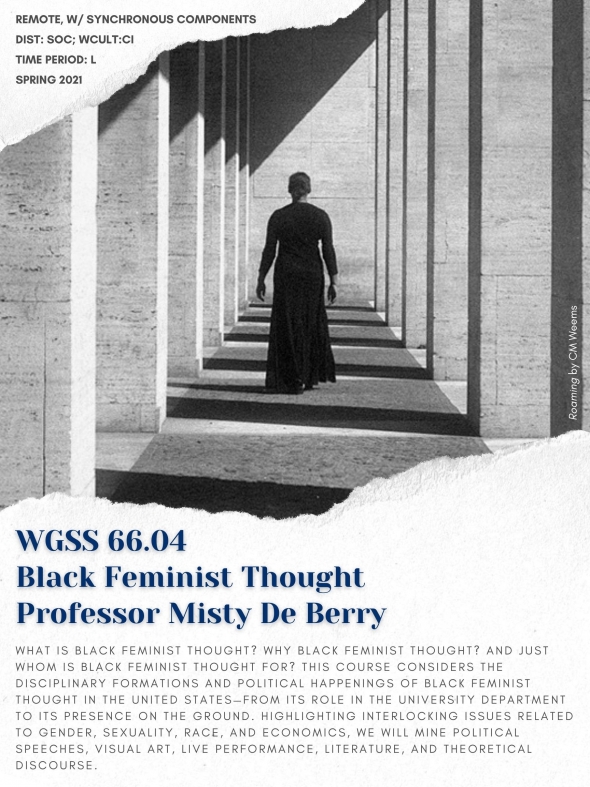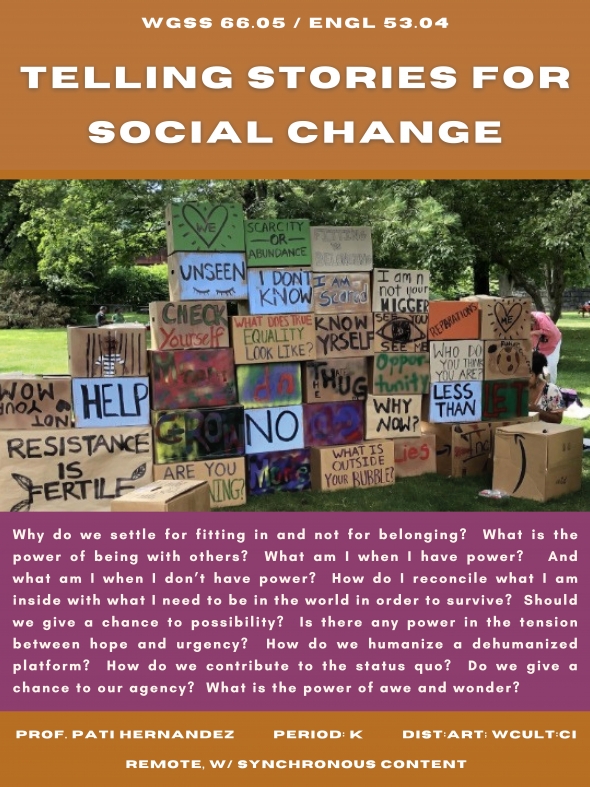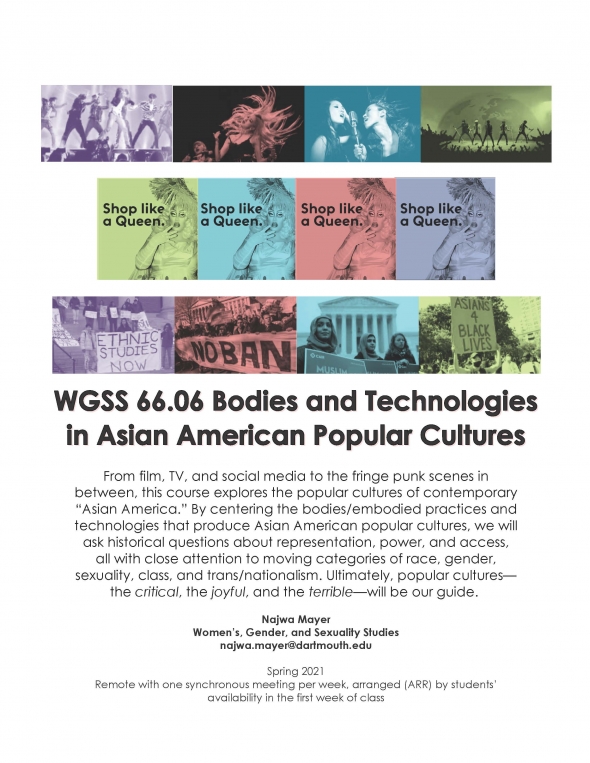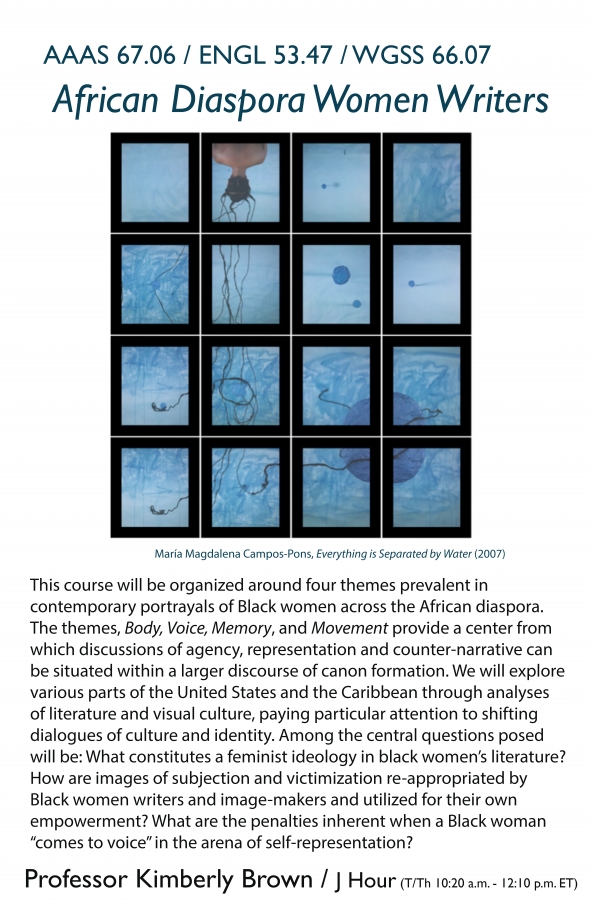Humanities and Human Rights (FYS)
First-Year Seminar in Women's, Gender, and Sexuality Studies
Period: D; Dist: ART
Remote, with synchronous content
Class Schedule Effective Fall 2020
Note: Course times are subject to change, and information on this page may occasionally be incorrect. The official timetable published by the Registrar's Office is the final and correct version of course listings and distributive credits.
First-Year Seminar in Women's, Gender, and Sexuality Studies
Period: D; Dist: ART
Remote, with synchronous content
First-Year Seminar in Women's, Gender, and Sexuality Studies
Period: L; Dist: TMV
Remote, with synchronous content
How do feminist, queer, and racialized minoritarian subjects move through and produce knowledge about inhospitable worlds, often against the limits of what is sayable, knowable, and thinkable? What makes a reading practice, text, or act feminist or queer? What makes critical knowledge critical? These questions will guide this seminar on feminist ways of knowing. Together we will explore the politics of knowledge and roles of theory in knowing and transforming the world.
Period: ARR; Dist:SOC; WCult:CI
Remote, with synchronous content
How have historical processes produced distinct sexual practices and identities over time? This course engages 300 years of a history that often evaded the historical record or was deliberately purged from it and asks how more traditional topics of U.S. historical inquiry—immigration, citizenship, economic organization, intellectual and artistic production, racialization, formal politics, law, religious practice—can yield new insights when sexual history is included as a legitimate dimension of analysis.
Period: H; Dist:SOC; WCult:W
Remote, with synchronous content
In Maid in America we study the representation, history, and rights of domestic workers in the Americas with a focus on the United States, Brazil, Mexico, Chile, and Argentina. Specifically, we look at representation and rights from artistic, legal, and sociological perspectives. Using the the theoretical frames of intersectional and transnational feminism we will analyze primary texts that include essays, manifestos, theater, and documentary film. Topics we will explore will include media representation and controlling images, migrant imaginaries, invisible labors, modern-day slavery, the feminization of migrant work, and labor organization and rights. The class will include a theater workshop component that will culminate in the public presentation of an original group performance titled: Making the Invisible Visible: The Politics of Domestic Labor.
Period: D; Dist:ART; WCult:CI
Remote, with synchronous content
This is a general course on women in politics. We will examine the role of women as politicians, activists, and voters. The course will examine a wide range of issue areas, including: female attitudes on war and conflict, the reactions of women to different kinds of campaign tactics and policy positions, the differing barriers women face to attaining elected office in different countries, and how the challenges thought to be faced by female political leaders compare with those faced by female business leaders. One key question we will explore concerns whether female politicians are treated differently than male politicians, and how that might affect their strategies for reelection and governance. Open to all students.
Period: E; Dist:SOC; WCult:CI
Remote, with synchronous content
This course explores the genre of young adult fiction in the 20th and 21st centuries. While the course will begin with a brief consideration of the conventions and early history of the genre, most of the course will examine post-1970s (most American) young adult novels. We'll trave the evolution of the genre in relation to ideas of racial innocence, sentimentality, consent, queer childhood, and revolutionary girlhood, and position the novels within historical contexts such as the rise of mass incarceration, settler colonialism, fantasies of post-racial politics, and environmental disaster. At the end of the course, we'll consider how young adult novels have created not just reading but creative communities and explore the kinds of fan productions that have emerged in relation to young adult novels. The course will include critical and creative assignments. Texts may include The Hunger Games; the Harry Potter series; Are You There God, It's Me Margaret; The Outsiders; The Astonishing Life of Octavian Nothing; Vivian Apple at the End of the World; Fangirl; Artistotle and Dante Discover the Secrets of the Universe; Absolutely True Diary of a Part-Time Indian; The Fault in Our Stars; Ship Breaker; Long Division; Monster; Akata Witch; Make Your Home Among Strangers.
Period: J; Dist:LIT; WCult:CI
Remote, with synchronous content
This course will introduce students to foundational and current thinking about the connections among language, gender, and sexuality, from readings in linguistics, sociolinguistics, linguistic anthropology, and feminist theory. A cross-cultural approach will characterize the class, and units will link language, gender and sexuality to themes such as power, (in)equality, and identity. Students will also be encouraged to consider the significance of gender and sexuality in the context of quotidian language use.
Period: J; Dist:SOC
Remote, with synchronous content
Women have worked in the film industry since its very beginnings, yet it is a popular conception that this is a recent phenomenon. This course will examine how women participated in the mainstream American film industry from the 1890's to the present as producers, directors, writers, photographers, fashion designers, performers, and audiences. Concept about female authorship, as well as historical questions about the cultural, social, and industrial contexts for women's power in the industry, will be explored. Films made by prominent women producers, directors, and writers will be screened.
Period: K; Dist:ART; WCult:W
Remote, with synchronous content

What is Black Feminist Thought? Why Black Feminist Thought? And just whom is Black Feminist Thought for? This course considers the disciplinary formations and political happenings of Black Feminist Thought in the United States—from its role in the university department to its presence on the ground. Highlighting interlocking issues related to gender, sexuality, race, and economics, we will mine political speeches, visual art, live performance, literature, and theoretical discourse.
Period: L; Dist:SOC; WCult:CI
Remote, with synchronous content

Telling My Story for Social Change uses readings in theory and practice (journals, exercises, performance) to explore the difficult themes of Race, Class, and Gender. By practicing listening, speaking and withholding judgment in a group, we build relations based on trust, communication, and dialogue. To do this, we must first identify and dismantle the visible and invisible walls of preconception and bias that surround us, which many times we actively help to create and maintain.
Period: K; Dist:ART; WCult:CI
Remote, with synchronous content

From film, TV, and social media to the fringe punk scenes in between, this course explores the popular cultures of contemporary "Asian America." By centering the bodies/embodied practices and technologies that produce Asian American popular cultures, we will ask historical questions about representation, power, and access, all with close attention to moving categories of race, gender, sexuality, class, and trans/nationalism. Ultimately, popular cultures—the critical, the joyful, and the terrible—will be our guide.
Period: ARR; Dist:ART; WCult:CI
Remote, with synchronous content

This course will be organized around four themes prevalent in contemporary portrayals of Black women across the African diaspora. The themes, Body, Voice, Memory, and Movement provide a center from which discussions of agency, representation and counter-narrative can be situated within a larger discourse of canon formation. We will explore various parts of the United States and the Caribbean through analyses of literature and visual culture, paying particular attention to shifting dialogues of culture and identity. Among the central questions posed will be: What constitutes a feminist ideology in black women's literature? How are images of subjection and victimization re-appropriated by Black women writers and image-makers and utilized for their own empowerment? What are the penalties inherent when a Black woman "comes to voice" in the arena of self-representation?
Period: J; Dist:LIT; WCult:CI
Remote, with synchronous content